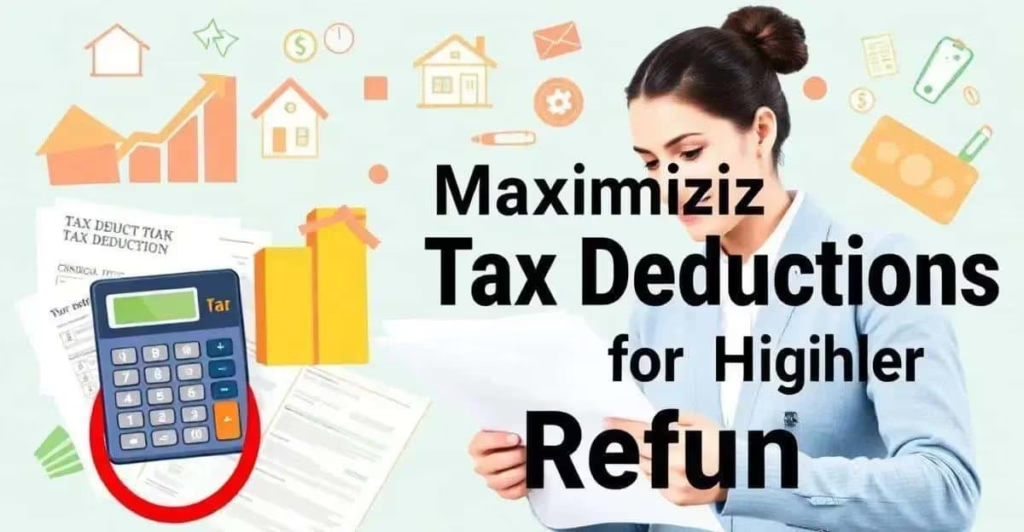Are you tired of overpaying your taxes? Maximizing your tax deductions is a crucial step in ensuring you get the maximum refund you’re entitled to.
With the right strategies, you can significantly reduce your tax liability and boost your refund.
In this article, we’ll explore the key tax deductions you can claim, how to itemize your deductions, and provide valuable tips for small business owners.
Understanding Your Tax Deductions
Understanding your tax deductions starts with understanding the different types of deductions available to you. The IRS offers a range of deductions, including standard deductions, itemized deductions, and miscellaneous deductions. It’s essential to understand the qualifications and limitations of each deduction to ensure you’re taking advantage of the ones that apply to you. For instance, the standard deduction is a fixed amount that can be claimed by all taxpayers, while itemized deductions require you to keep track of receipts and documentation for expenses such as mortgage interest, charitable donations, and medical expenses. By understanding the different types of deductions, you can make informed decisions about which ones to claim and maximize your refund.
Common Tax Deductions to Claim
Common tax deductions to claim can help you reduce your taxable income and minimize your tax liability. These deductions can include charitable donations, mortgage interest, property taxes, and state and local income taxes. It’s essential to keep accurate records of these expenses to ensure you’re eligible to claim them. For instance, mortgage interest payments can be claimed as a deduction on Schedule A, while charitable donations can be claimed as a deduction on Schedule A or Schedule C, depending on the type of donation.
Maximizing Your Itemized Deductions
Maximizing your itemized deductions requires careful record-keeping and attention to detail.
Itemized deductions can include expenses such as mortgage interest, property taxes, charitable donations, and medical expenses.
To claim these deductions, you’ll need to keep accurate records of your expenses, including receipts, invoices, and bank statements.
The IRS provides a range of forms and schedules to help you report these deductions, including Form 1040, Schedule A, and Form 8829.
By itemizing your deductions, you can reduce your taxable income and minimize your tax liability.
It’s essential to consult with a tax professional to ensure you’re claiming all the deductions you’re eligible for and to maximize your refund.
Claiming the Standard Deduction
The standard deduction is a fixed amount that can be claimed by all taxpayers, and it’s designed to simplify the tax filing process.
To claim the standard deduction, you’ll need to complete Form 1040 and attach a statement indicating that you’re claiming the standard deduction.
The amount of the standard deduction varies depending on your filing status and income level. For the 2022 tax year, the standard deduction is $12,950 for single filers and $25,900 for joint filers.
By claiming the standard deduction, you can reduce your taxable income and minimize your tax liability.
However, if you have itemized deductions that exceed the standard deduction, you may want to consider itemizing your deductions instead.
Tax Deductions for Small Business Owners
Tax deductions for small business owners can help reduce the financial burden of running a small business.
As a small business owner, you may be eligible to claim deductions on your business expenses, such as equipment, supplies, travel expenses, and employee salaries.
To claim these deductions, you’ll need to keep accurate records of your business expenses, including receipts, invoices, and bank statements.
The IRS provides a range of forms and schedules to help you report these deductions, including Form 1040, Schedule C, and Form 8829.
By claiming these deductions, you can reduce your taxable income and minimize your tax liability.
It’s essential to consult with a tax professional to ensure you’re claiming all the deductions you’re eligible for and to maximize your refund.
FAQs on Maximizing Tax Deductions
FAQs on maximizing tax deductions can help you navigate the complex world of tax deductions. What types of expenses can be claimed as deductions? How do I keep accurate records of my expenses to claim deductions? Can I claim deductions for business expenses on my personal tax return? What are the penalties for not reporting deductions correctly? These are just a few of the questions that may arise when trying to maximize your tax deductions.
By understanding the different types of deductions and how to claim them, you can reduce your taxable income and minimize your tax liability.
FAQ – Frequently Asked Questions about Tax Deductions
What types of expenses can be claimed as deductions?
Common tax deductions include charitable donations, mortgage interest, property taxes, and state and local income taxes. Additionally, business owners can claim deductions for business expenses, such as equipment, supplies, travel expenses, and employee salaries.
How do I keep accurate records of my expenses to claim deductions?
To claim deductions, you’ll need to keep accurate records of your expenses, including receipts, invoices, and bank statements. The IRS provides a range of forms and schedules to help you report these deductions, including Form 1040, Schedule A, and Form 8829.
Can I claim deductions for business expenses on my personal tax return?
Business expenses can be claimed on your personal tax return, but you’ll need to keep accurate records and follow the IRS guidelines.
What are the penalties for not reporting deductions correctly?
Failing to report deductions correctly can result in penalties and interest. It’s essential to consult with a tax professional to ensure you’re claiming all the deductions you’re eligible for and to avoid penalties.
What types of tax forms do I need to file?
The types of tax forms you need to file depend on your filing status and income level. Common forms include Form 1040, Schedule A, and Form 8829. Consult with a tax professional to determine which forms apply to your situation.
How do I determine which deductions I’m eligible for?
To determine which deductions you’re eligible for, consult with a tax professional or review the IRS guidelines. They can help you identify which deductions apply to your situation and ensure you’re claiming all the deductions you’re eligible for.




